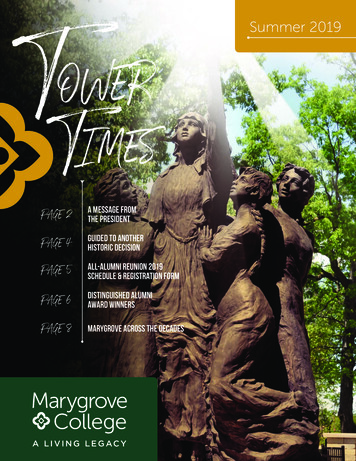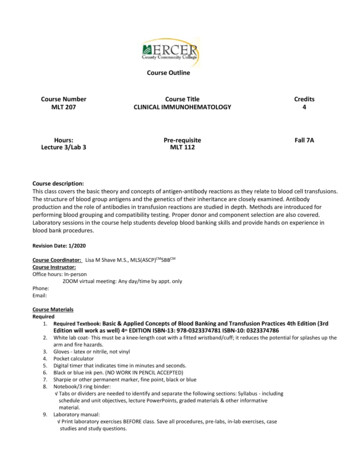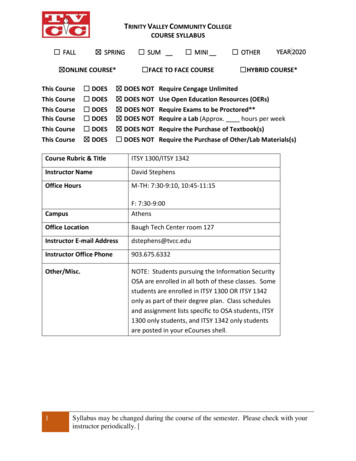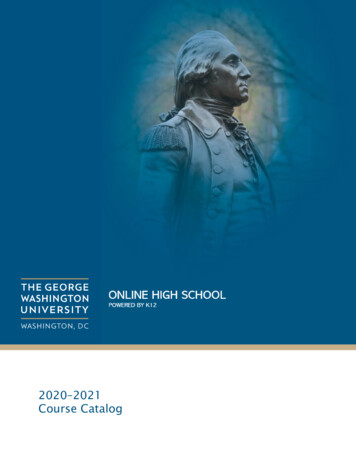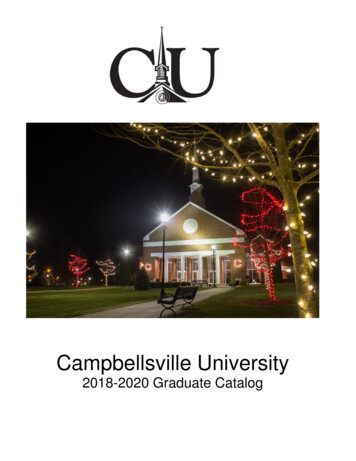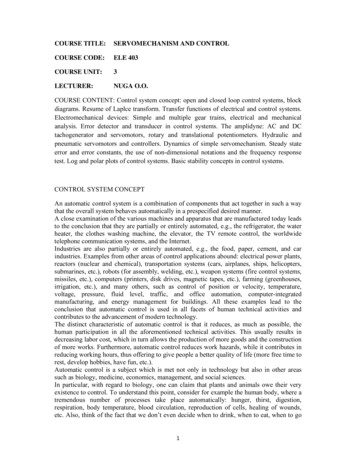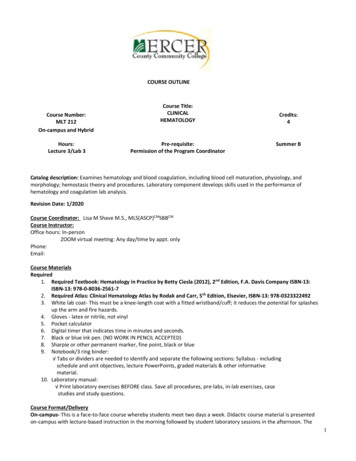
Transcription
COURSE CATALOG 2018-20208425 WEST MCNICHOLS ROADDETROIT, MICHIGAN 48221PHONE: (313) 927-1200WWW.MARYGROVE.EDU
8425 W. MCNICHOLS ROAD, DETROIT, MI 48221TELEPHONE: 313-927-1200, FAX: 313-927-1345, WEB: HTTP://WWW.MARYGROVE.EDUCollege Office Hours: Administrative offices are open Monday through Friday, 9:00 a.m. to 5:00 p.m.The College observes the following holidays: New Year’s Eve, New Year’s Day, Martin Luther King Day,Good Friday, Memorial Day, Independence Day, Labor Day, Thanksgiving Day, Friday after Thanksgiving,Christmas Eve, and Christmas Day.The provisions of this catalog are not regarded as an irrevocable contract between the student and Marygrove College. Wehave attempted to present information about the College as accurately and completely as possible. However, the Collegereserves the right to change provisions or requirements at any time without notice.MARYGROVE COLLEGE INFORMATION SOURCESAdmissions . 313-927-1240FAX 313-927-1399Alumni Relations. 313-927-1443Campus Safety:Campus Safety Office . (313) 927-1401Outside Security Booth . (313) 927-166624-Hour Emergency Phone Number . (313) 927-1411Conference Center. (313) 446-8060Copy Center/Mailroom . (313) 927-1356FAX: (313) 927-1345; E-MAIL: ccc@marygrove.eduCounseling. (313) 927-1474Facilities Department. E-MAIL: facilities@marygrove.eduFinancial Aid.(313) 927-1692, FAX: (313) 927-1399Nancy A. McDonough Geschke Library:Circulation Desk. (313) 927-1355Administration. (313) 927-1344Immediate Research Assistance via a 24/7 Virtual ReferenceChat cy A. McDonough Geschke Scholars Commons:Reference Desk. (313) 927-1346Administration . (313) 927-1344Scheduling Site for Face-to-face and om/Information Technology (IT) Help. (313) 927-1282Online Help Desk Site. http://support.marygrove.edu/Registrar.(313) 927-1260, FAX: (313) 927-1262h /registrars-office.htmlWomen’s Center. (313) 927-1274Marygrove College is accredited by The Higher Learning Commission, a commission of the North Central Association ofColleges and Schools (NCA) at 30 North LaSalle Street, Suite 2400, Chicago, Illinois 60602-2504, phone: (800) 621-7440.Accreditation information can be found in the Marygrove library or on our website www.marygrove.edu.Marygrove College is approved by the Michigan State Department of Education.Marygrove College does not discriminate on the basis of sex, age, race, national or ethnic origin, religionor handicap in its educational or financial aid programs.MARYGROVE COURSE CATALOG 2018-2020 FOR THE MOST UPDATED INFORMATION, VISIT MARYGROVE.EDU–2–
TABLE OF CONTENTSMarygrove College Information Sources. 2Academic Calendar. 4Letter from the President. 5History of the College. 6Mission, Vision, Values and Sponsorship. 11Hallmarks of the College. 12Campus Facilities. 13Campus Life. 15Graduate Admissions Process. 18Financial Information. 23Academic Policies. 28Appeal and Review Procedures. 36Graduate Studies at Marygrove College. 44Added Endorsement Program for Teachers. 45Educational Leadership and Administrative Certification. 48Educational Technology. 52Human Resource Management. 55Master in the Art of Teaching. 58Master of Education (M.Ed.) Plus Teacher Certification. 64Professional Development for Educators. 72Reading. 74Social Justice. 77Special Education. 81Marygrove College Board of Trustees. 86Administrative & Professional Staff. 87Faculty. 88Index. 90Campus Map. 93MARYGROVE COURSE CATALOG 2018-2020 FOR THE MOST UPDATED INFORMATION, VISIT MARYGROVE.EDU–3–
ACADEMIC CALENDAR 2018-2020SUMMERWINTERFALL2019 ACADEMIC YEARFall 2018 – Summer 2019RegistrationTerm BeginsLabor Day Weekend (No Classes)Classes Begin for Full-Term InstructionOnline Session I BeginsAdd/Drop Period Full-Term CoursesAdd/Drop Period Session IGraduation Application Deadline for December and MayOnline Session I EndsSession I Grades DueOnline BreakOnline Session II StartsLast Day to Withdraw from a Fifteen-Week CourseThanksgiving Break (No classes, School Closed, MAT Open)Last Day of Classes Full SessionLast Day of Online Session II CoursesOfficial End of SemesterGrades Due for Full and Session II DueChristmas Holiday Break (School Closed)RegistrationTerm BeginsOnline Session I BeginsClasses Begin for Full-Term InstructionAdd/Drop Period Full-Term CoursesAdd/Drop Period Online Session IMartin L. King Holiday (School Closed)Online Session I EndsSession I Grades DueSpring BreakOnline Session II BeginsLast Day to Withdraw from a 15-week CourseEaster Break (No Weekend Classes, MAT Open)Last Day of Classes Full SessionLast Day of Online Session II ClassesOfficial End of SemesterGrades Due for Full and Session II DueGraduationRegistration BeginsTerm BeginsOnline Classes Session I BeginsClasses Begin for 15 Weeks of InstructionAdd/Drop Deadline for Session I CoursesMemorial Day HolidayLast Day to Withdraw Summer IOnline 1st Session EndsOnline BreakEnd of Summer Session IGrades Due for Summer Session IOnline Session II BeginsOn-Campus Session II BeginsAdd/Drop Deadline Session IILast Day to Withdraw Summer IIOfficial End of SemesterGrades Due for Summer Session IIGrades Due Summer Session II MATMarch 7 – September 3SeptemberSeptember 1 – 3September 4September 2September 4 – 11First Day of ClassesSeptember 17October 21October 28October 22 – 27October 28November 26November 22 – 25December 8December 15December 15December 18December 24 – January 1October 29 – January 5January 6January 6January 7January 7 – 14First Day of ClassesJanuary 21February 24March 1February 25 – March 2March 3April 6April 19 – 21April 20April 21April 27May 2 @ 5pmMay 11March 3 – May 4May 6May 5May 13First Day of ClassesMay 27June 19June 23June 24 – 30June 29July 8July 1July 1First Day of ClassesJuly 30August 18August 19August 202020 ACADEMIC YEARFall 2019 – Summer 2020March 9 – September 2September 1August 30 – September 2September 3September 1September 3 – 9First Day of ClassesSeptember 20October 20October 27October 21 – 26October 27November 25November 28 – December 1December 7December 14December 14December 17December 24 – January 1October 28 – January 4January 5January 5January 6 – 13January 6 – 13First Day of ClassesJanuary 20February 23February 28February 24 – 29March 1April 4April 10 – 12April 18April 19April 26April 30May 9March 9 – May 2May 4May 3May 11First Day of ClassesMay 25June 17June 21June 22 – 28June 27July 6June 29June 29First Day of ClassesJuly 28August 16August 17August 18MARYGROVE COURSE CATALOG 2018-2020 FOR THE MOST UPDATED INFORMATION, VISIT MARYGROVE.EDU–4–
– FROM THE PRESIDENT –WELCOME TO MARYGROVE COLLEGE!On behalf of our faculty and staff, thank you for choosing Marygrove toadvance your career and your life. A graduate degree from Marygrovewill add knowledge and skills that can translate directly into leadershippositions in your profession.Marygrove College, an independent, Catholic graduate institution,sponsored by the Sisters, Servants of the Immaculate Heart of Mary, educates students from diverse backgrounds, fosters values-based leadership, provides innovative graduate studies and professional developmenttoward career enhancement and social responsibility, and serves as an institutional leader within the city of Detroit.We are widely recognized for our commitment to the metropolitan Detroitcommunity and we have a national reputation for citizen leadership.Indeed, our vision is that Our students, as citizen-leaders, will inspiretransformative change in their workplaces, communities, and societythrough intellectual rigor and professional excellence, creativity andimagination, active compassion for others, and lifelong commitmentto a just, humane, and inclusive world.Our graduate faculty are highly qualified and have significant experience in their disciplines. Most are publishedauthors and presenters in their fields of expertise. All are dedicated to fostering the importance of citizen leadership into virtually every course and program we offer.We prepare students to become leaders in their chosen fields and in their communities. We promote lifelonglearning, a connectedness to the greater community, personal responsibility and professionalism. Whether youengage with Marygrove online or on campus, it’s an environment of care and concern for all members of thecampus community as well as the larger world in which we live.Our values form the basis for everything we do at Marygrove. The values of human dignity, community, socialjustice, ecological justice, excellence, innovation and diversity are what students embrace and live out as a resultof their education here. Marygrove College presents opportunities for graduate students to participate in activitiesand programs that transform them into effective leaders with the skills and experience that prepare them to dealwith complexity and yet remain grounded. We look forward to challenging you and enriching your career goals.Welcome.Dr. Elizabeth A. BurnsMARYGROVE COURSE CATALOG 2018-2020 FOR THE MOST UPDATED INFORMATION, VISIT MARYGROVE.EDU–5–
HISTORY OF THE COLLEGESr. Theresa Maxis, I.H.M.Fr. Louis Florent Gillet, C.SS.R.The history of Marygrove does not begin with the year 1927or the city of Detroit, but with the year 1845 and the town ofMonroe. On November 10, 1845, three women made religiousvows at St. Mary Parish in Monroe, formally beginning areligious congregation known today as the Sisters, Servants ofthe Immaculate Heart of Mary, or IHMs.Michigan, Ohio and Pennsylvania followed this beginning, butthe Academy remained the center of innovation and progressin the IHM educational system.Marygrove is the direct descendant of the original St. MaryAcademy. By the beginning of the twentieth century, theAcademy had begun to offer college-level courses and by 1905,the Sisters had built a separate St. Mary College. In 1910, theState of Michigan empowered the college to grant degrees, andin 1914, the State Department of Education authorized it togrant teaching certificates. Those original charters are still ineffect at Marygrove today.One of the three, Sister Theresa Maxis, had been invitedto come to Monroe by a Redemptorist missionary priest,Father Louis Florent Gillet. Together, they are consideredthe co-founders of the IHM congregation.Theresa Maxis, a woman of color, was the first leader of thenew community. Of Haitian origin, she had formerly servedas president of the Oblate Sisters of Providence, a blackcommunity of Catholic women in Baltimore, Maryland.When she arrived in Monroe, she began almost immediatelyto develop a school for young women.OriginalSt. MaryAcademypostcard.On Christmas day, a notice appeared in the Monroe Advocateannouncing the opening of a “Young Ladies Academy” offeringa course of study that included French and English grammar,arithmetic, mythology, bookkeeping, needlework, beadwork,tapestry, worsted flowers, and music.MarygroveCollege isthe directdescendantof thisOn January 15, 1846, St. Mary Academy welcomed itsfirst students. The opening of parochial schools throughoutAcademy.MARYGROVE COURSE CATALOG 2018-2020 FOR THE MOST UPDATED INFORMATION, VISIT MARYGROVE.EDU–6–
HISTORY OF THE COLLEGE(CONTINUED)of building a curriculum that would enable the professionaleducation of women, many of whom would be the first intheir families to obtain a college degree.In the early 1920s, it became apparent to the IHMCongregation and to Church leaders in Detroit that the collegewas outgrowing its buildings and that Detroit would be amore appropriate site for a new campus. Mother DomitillaDonohue agreed with Detroit’s bishop that moving the collegeto the city would give more women an opportunity for highereducation. They also believed that the college would have alarger field of influence in Detroit and that the college coulditself be a monument to the city of Detroit. Accordingly, inMarch 1922, Mother Domitilla purchased an 80-acrewooded tract in a developing area of northwest Detroitas the site of the new St. Mary College for a quarter of amillion dollars.The system of education that Dr. Derry devised—and the IHMfaculty shaped—derived from a theory of education based onthe liberal arts. An art, according to Dr. Derry, was the rightway of doing a thing. This philosophy came to be known togenerations of alumnae as The Marygrove Idea. It encouragedMarygrove women to develop personal power, to be drivingforces in their chosen fields, to act consciously on their ownvalues, and to be proficient in what Dr. Derry considered theseven liberal arts: The purchase price of the land, however, exhausted the moneythat had been set aside to build the new campus in Monroe.Undaunted, the Congregation launched a Building CampaignFund in 1923, culminating in a week-long Marygrove Festivalat the Arena Gardens in Detroit. With the help of the St. MaryAlumnae Association, Michigan parishes, graduates of IHMschools, and Detroit business leaders, the Festival alone raised 101,000. Still, the total campaign fund itself could not matchthe cost of the new buildings. So, in an act of courage, faith,or sheer bravado difficult to imagine today, Mother Domitillaand her governing council indebted the IHM Congregation forthe 4 million necessary to build and equip the college.The art of behavior before GodThe art of behavior within societyThe art of expressionThe art of reasoningThe art of historical realizationThe art of leisureThe art of making a livingThe test of a college, Dr. Derry believed, was what itsgraduates knew and could do.Certainly, one woman who embodied what the Marygrovewoman ought to be was Sister Honora Jack, IHM, presidentof the College for twenty-four years (from 1937-1961).Her history at Marygrove began in 1927 as the first Englishprofessor; later she served as dean of the College from1930-1937. Under her direction, the curriculum emphasizedspeaking and writing skills, critical thinking, and collaborativeand interdisciplinary learning. In what Sister Honora called asystem of “planned integration” and today’s educators woulddescribe as a series of synthesizing experiences, Marygrovestudents moved through a course of study that included afreshman orientation, a sophomore open-forum, and juniorsenior seminars. These classes required students to thoroughlyresearch and write a paper, present it orally, discuss it,and defend it in the company of students and faculty fromseveral disciplines.The new site suggested a new name, and in 1925, withthe laying of the cornerstone of the present Liberal ArtsBuilding, St. Mary College became Marygrove College.Two years later, in September 1927, the gates of the Detroitcampus opened, welcoming 287 students, 100 of whom weresophomores, juniors, or seniors.The first class of Marygrove students was greeted by thefirst lay president of a Catholic women’s college in the U.S.,Dr. George Hermann Derry (1927-1937). Dr. Derry, educatedat the Catholic University of Paris, was an educator, a scholar,a philosopher, and a lecturer with an international reputation.His experience included chairing the political sciencedepartment at Bryn Mawr and the philosophy department atMarquette University.So that Marygrove women would move naturally intowhat Sister Honora thought of as “the normal work-life ofthe world,” she inaugurated an academic requirement of“professional contacts.” Each department required its studentsto attend a certain number of professional meetings related totheir major field each semester.Dr. and Mrs. Derry lived with their three children in thepresident’s house on campus (now Hartman Hall), oftenentertaining intellectual figures of international importance.Dr. Derry frequently invited Marygrove undergraduates tomeet the guests as part of the students’ social and culturaldevelopment.Sister Honora’s educational vision was recognized in 1943when the Association of American Universities, an associationof graduate schools, placed Marygrove on the approved list.This was the highest possible rating for an undergraduateinstitution at the time. In 1947, the American Association ofUniversity Women accepted Marygrove as a corporate member.Mother Domitilla appointed Dr. Derry the first president ofthe new college because his philosophy of education matchedthe Congregation’s own vision of scholarly excellence, serviceto the professions, and commitment to social justice. Inparticular, the Congregation charged Dr. Derry with the taskMARYGROVE COURSE CATALOG 2018-2020 FOR THE MOST UPDATED INFORMATION, VISIT MARYGROVE.EDU–7–
HISTORY OF THE COLLEGE(CONTINUED)This program, begun in 1966, was the first to provide stategrant money to students who might not otherwise be ableto afford a private Michigan college.Student involvement in community service was also animportant educational value for Sister Honora, so importantthat she created the staff position of director of socialaction. The director’s chief function was to provide direction,counseling, and supervision of students
Marygrove College is accredited by The Higher Learning Commission, a commission of the North Central Association of . Colleges and Schools (NCA) at 30 North LaSalle Street, Suite 2
